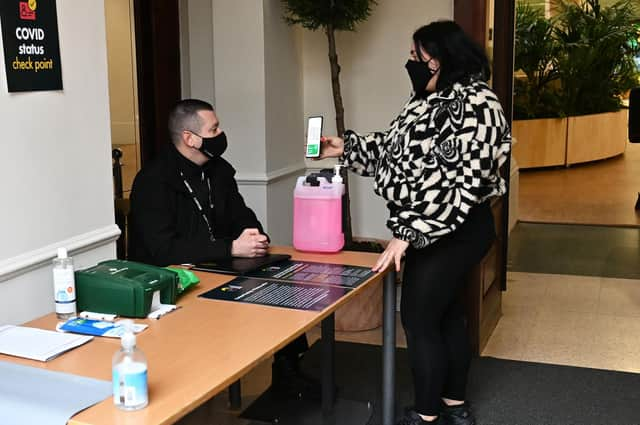Covid passports 'proportionate and legitimate response to pandemic'


Senior judges held that the so-called passports were lawfully introduced amid a deteriorating situation in the province’s hospitals.
They rejected all claims that the system for gaining entry to bars, restaurants and cinemas during the crisis violated civil liberties of the unvaccinated and breached data protection regulations.
Advertisement
Hide AdAdvertisement
Hide AdLord Justice Treacy confirmed: “The regulations at issue were in accordance with the law and served a legitimate aim and were proportionate and justifiable.”
In November 2021 the Stormont Executive brought in the certification scheme in a bid to curb the spread of Covid-19.
The measures – since scrapped – required proof of full vaccination status, a negative test, or recovery from the virus to enter hospitality venues.
Belfast man Risteard O’Murchu and Darren Williams, from Carrickfergus, Co Antrim brought separate challenges to the lawfulness of the scheme.
Advertisement
Hide AdAdvertisement
Hide AdMr O’Murchu claimed the regulations were an unjustified and intrusive step which stigmatised and discriminated against the unjabbed.
Mr Williams alleged a breach of data protection in how confidential personal information was obtained by scanning customer QR codes.
In February last year the High Court dismissed both challenges after finding that the scheme was justified.
Even though the passports are no longer required, appeals were mounted against that decision.
Advertisement
Hide AdAdvertisement
Hide AdRuling on the cases, Lord Justice Treacy said there had unarguably been a legitimate aim behind a scheme backed by the chief medical officer and the chief scientific advisor.
He went on: “There was scientific evidence to support the argument that restricting access to vaccinated or non-infected persons in high risk settings has the potential to reduce transmission of the virus.”
Any interference with Mr O’Murchu’s human rights was limited and did not prohibit attendance at high risk settings, the court held.
Dismissing Mr Williams’ appeal, the judge concluded: “The challenge is wholly academic, serves no utility and there is no public interest or good reason that this court can discern which would justify determining such a plainly academic matter.”